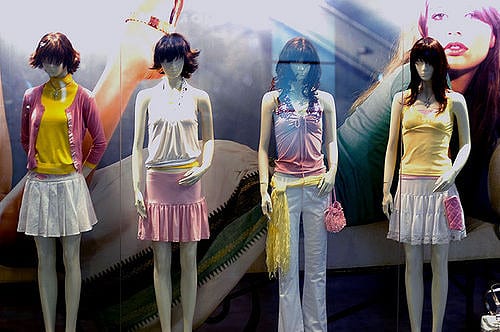We’re sure that you’ve heard the phrase “You are what you eat,” but what about the phrase “You are where you shop?” In our current society of addictive consumerism, they may both be equally true – and that’s before we even begin a discussion of the consumerism of food! In today’s society, “You are where you shop” isn’t just a way to identify yourself, it’s a way to identify others. As much as individual brands have developed a sense of giving people identity, so has shopping at specific stores. While it’s always true that there’s been a difference between “luxury brand” shopping and other shopping, the idea that you are where you shop has gotten to the point where it actually helps to craft overall identities. That, obviously, isn’t a good thing. Today, we’ll explore just the tip of the iceberg of this situation and get you thinking about whether you define yourself or others by the places where they shop.
Walmart, Target or Macy’s?
Let’s keep things honest here. In many cases, you can purchase the exact same merchandise at any of the three locations that we just listed. But we strongly suspect that you prefer one over the other at most times. Ethical issues with big box stores aside, perhaps you feel as though you’re simply not a member of the “People of Walmart.” Or perhaps you feel that you’re exactly part of that demographic. Maybe you find Target a little too “hipster,” or perhaps just hipster enough. Maybe you are willing to pay a slightly higher price per item at Macy’s because, well, you just don’t shop at those other kinds of stores (and you like the perfume counter). Whatever the reason, chances are that much of your decision about where you purchase a coffee maker or bathmat has little to do with anything other than which of the three groups we just described you self-identify with. And each of those groups has an implication. Be honest, if you are not a Walmart shopper, don’t you secretly look at the “People of Walmart” when you end up going into one?
The history of groups identifying themselves through a brick and mortar organization that represents their shared beliefs is obviously long. The most obvious example, of course, would be religious organizations and churches. Even within the same town, there could be two Baptist congregations that serviced two extremely different populations. With Judaism, there could be several different temples in the same town that also serviced different populations who expressed their beliefs differently. It doesn’t take a huge leap to see the current similarities between how people defined their groups and identities by churches and how that has morphed into retail locations in our current religion of consumerism. We’d advise you not to think about it too much or you’ll be epically sad.
Niche Brand Stores Do Not Define You Either
We used big stores with big names to talk about how people define themselves by where they shop above, but the same is true of smaller, niche brands. Are you shopping at the trendy urban boutique or the out-of-the-way mom and pop store? Yes, we know what you’re saying. Some of this may simply be driven by proximity to stores. That’s a great point. So we’d ask you to do this exercise. Imagine yourself on a street in your own neighborhood, but suddenly overnight there are three shoe stores. One is a Payless. One is a locally owned store that sells Tom’s shoes and shoes by local artisans. One is a designer boutique. Which do you patronize even if all three of them are right next door to each other on a street in your very neighborhood? Why do you go to that one? Is it truly because of a price difference or a lifestyle choice or a brand that you love? Or is it because you simply feel more attached to or relatable to one type of those stores? Only you know the answer, but we suspect that if you took the time to deeply reflect on it you would find that there’s a reason you favor one of those stores and not the other two.
Our Advice: Be Your Own Brand
We love to use the phrase “be your own brand” when it comes to combatting consumer marketing. After all, brands in general are the actual stamp of consumerism on our society. We actually also think that you’ll be happier when you find an individual style that speaks to you as opposed to one dictated by marketers in offices. What is that style? That’s a journey for you to undergo, and we think it may be a fun one that, along the way, will help you build confidence.
The first step, though, is to understand that where you shop and what you buy there doesn’t define you. You may have ethical issues walking into a Walmart, but that doesn’t make you a “person of Walmart.” You may get to buy a “luxury brand” by walking into a boutique store, but that doesn’t make you one of the one percent. What makes you “you” is something so much more complex than the name on the bag that you leave the store with.
It starts with you, though. Not only do you need to avoid defining yourself by where you shop, but you need to be diligent about not defining others by where they shop. That means no judging the wealthy who don’t think twice about a stop at Spiegel and, equally so, not indulging in “People of Walmart” blogs with judgmental glasses. Let’s all commit to looking deeper than where we park our car (or bike, etc) when we go shopping.
It can be a better world. Slowly but surely we see the symptoms of addictive consumerism being overcome, and it encourages us.
Have a different take on defining yourself by where you shop? Tell us about it on the social media channels below.
Facebook | Twitter | Instagram | Tumblr | Pinterest | Google+ | Medium
Photo Credit: Juin Hoo via Flickr





